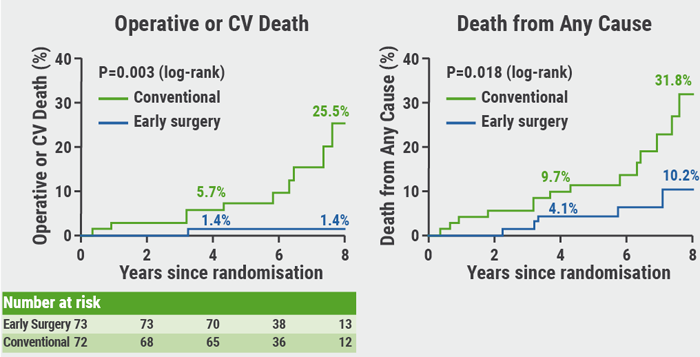Presenting the phase 1 and 2 study targeting APOC3, Prof. Christie Ballantyne (Baylor College of Medicine, USA) focused on the safety and tolerability of the RNAi therapy given as a single dose or 2 monthly doses [1]. Likewise, presenting the phase 1 and 2 study targeting ANGPTL3, Prof. Gerald Watts (University of Western Australia, Australia) showed the durability of that RNAi [2].
Invited discussant for both presentations, Prof. Daniel J. Rader (University of Pennsylvania, USA), compared the 2 studies head-to-head. The dose ranges were 10-100 mg for APOC3 silencing and 35-300 mg for ANGPTL3 silencing, which resulted in a maximum reduction in serum APOC3 protein levels of 94% versus 83% for ANGPTL3 protein levels. At the highest doses, silencing APOC3 reduced triglyceride levels by 64%, whereas silencing the ANGPTL3 gene did so by 66%. In both cases, these reductions were durable for at least 16 weeks. Silencing of APOC3 and ANGPTL3 decreased the mean maximum low-density lipoprotein (LDL) levels by 30% and 25%, respectively. One point of difference was that silencing APOC3 was associated with an HDL-C increase of 52%, whereas ANGPTL3 silencing decreased HDL levels by up to 16%. It is unclear what this discrepancy may indicate.
No serious adverse events were reported for either study. Although rare in frequency, reactions at the injection site did occur but were all mild. It remains to be investigated how these RNAi therapies compare to antibody- and antisense oligonucleotide-based methods that target the same proteins.
Prof. Radar concluded: “We are in a brave new world of RNAi therapeutics, a very interesting technology that is similar to but mechanistically different than antisense oligonucleotides.” Here, the process is ‘catalytic,’ in that “the same molecule can go around and destroy multiple aspects of the RNAs in a way that provides substantial longevity in terms of their duration of effect.”
- Ballantyne C, et al. RNA interference targeting apolipoprotein C-III results in deep and prolonged reductions in plasma triglycerides. LBS06, AHA Scientific Sessions 2019, 14-18 November, Philadelphia, USA.
- Watts GF, et al. RNA interference targeting hepatic angiopoietin-like protein 3 results in prolonged reductions in plasma triglycerides and LDL-C in human subjects. LBS06, AHA Scientific Sessions 2019, 14-18 November, Philadelphia, USA.
Posted on
Previous Article
« Complete revascularisation for obstructive non-culprit lesions with vulnerable plaque Next Article
Early apixaban safe as secondary prevention of stroke from AF »
« Complete revascularisation for obstructive non-culprit lesions with vulnerable plaque Next Article
Early apixaban safe as secondary prevention of stroke from AF »
Table of Contents: AHA 2019
Featured articles
New Approaches to CVD Risk Reduction
Phase 3 BETonMACE trial did not meet its primary endpoint
Inclisiran safely halves LDL-Cholesterol
Colchicine prevents cardiovascular events
Interventional Management for Acute Coronary Syndrome
Drop aspirin after 3 months in non-STEMI ACS patients on dual antiplatelet therapy
Immediate coronary angiography after cardiac arrest does not improve survival
Complete revascularisation for obstructive non-culprit lesions with vulnerable plaque
Colchicine: no difference in peri-procedural cardiovascular events 30 days post-PCI
Intra-aortic balloon pump better than Impella: new observational data
Results for the Ischemia Trials: To Intervene or Not to Intervene
ISCHEMIA trial: Invasive treatment only better for angina burden
Controversies in Contemporary Management of Aortic Stenosis
Full GALILEO results: Why did rivaroxaban fail after TAVR?
Balloon-expandable better than self-expanding transcatheter heart valves
RECOVERY: Benefit of early surgery in asymptomatic severe aortic stenosis
Guidelines: Updates and Controversies
New guidelines on the prevention of cardiovascular conditions
Trials in Electrophysiology and Left Ventricular Function
RENAL-AF trial: Apixaban similar to warfarin
Apple Heart Study: Not just for atrial fibrillation
Early apixaban safe as secondary prevention of stroke from AF
Carvedilol does not improve exercise performance in Fontan patients
New Frontiers in Lipid Therapy
Icosapent ethyl plus statins reduces total plaque volume
ORION-9: Inclisiran RNAi halves LDL in familial hypercholesterolaemia patients
New RNAi therapies to reduce triglycerides: 2 studies show favourable results
Targeting LDL-C <70 mg/dL is better than 100 mg/dL after stroke
Challenges in Heart Failure Management
FUEL trial: Udenafil improves some exercise measurements in Fontan
DAPA-HF: Dapagliflozin also good for heart failure patients without diabetes, of any age, or any health status
PARAGON-HF: Benefits for women and lower ejection fraction
Related Articles
February 26, 2020
Testosterone gel increases left ventricular mass
February 26, 2020
Icosapent ethyl plus statins reduces total plaque volume

© 2024 Medicom Medical Publishers. All rights reserved. Terms and Conditions | Privacy Policy

